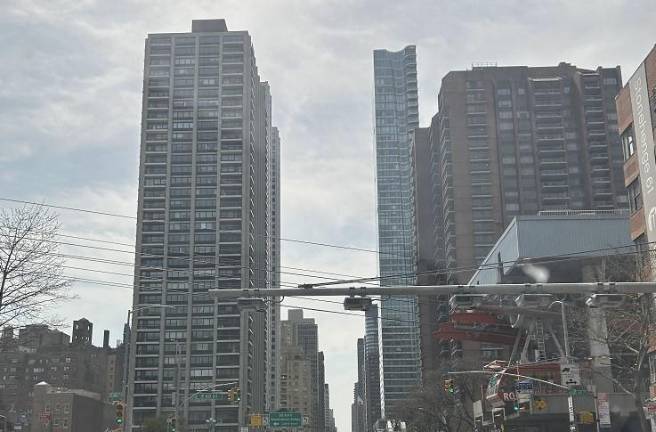Congestion Tolls Stay On, Feds Threaten Highway Funds
The Trump administration wanted the Manhattan traffic tolls turned off by April 20. The MTA has refused to do so without a court order. Now, the Trump administration is publicly threatening to federal highway funds to NY if the tolls don’t end by May 21.

Congestion pricing tolls are still being collected, the MTA says, after the federal government sought to unilaterally shut them down by April 20.
Yet the Trump administration is threatening to suspend future federal highway funds, while the MTA sues them to argue that suspending the program would be unconstitutional.
Citing an agreement that NYS and the MTA previously made with the Biden administration to get the tolls up and running, Gov. Kathy Hochul and the transit agency say that they will continue to hold firm unless a court order tells them otherwise.
In a statement issued to the press, Hochul simply said that “the program is working. Traffic is down, business is up and the cameras are staying on.”
On April 21, U.S. Transportation Secretary Sean Duffy sent an angry letter to Governor Hochul about the toll collection–and gave a one-month “extension,” the second so far, for the tolls to remain operating. After that point, he wrote, he will begin doling out “serious consequences” by April 28.
Specifically, he says that the Federal Highway Administration will “impose appropriate measures to ensure compliance,” including halting most construction & environmental approvals for Manhattan roadway projects that aren’t deemed “essential for safety.”
”The corrective measures may be expanded into other geographic areas within New York State,” he added. “Rather than establishing good transportation under this pilot project, the Biden administration sought to advance its preference for funding transit systems over highway improvements.”
During peak hours between 5 a.m. to 9 p.m., the tolls sit at $9 for most drivers entering the Manhattan “congestion zone” below 60th St. They were implemented in order to collect $500 to $600 million in tolls, which would be used to raise money via bonds for $15 billion dollars worth of mass transit upgrades in the NY metropolitan region.
As their name indicates, the tolls also designed to reduce traffic congestion in the zone. MTA data suggests that this is working so far. From January to March, about 5.8 million fewer vehicles entered the tolling zone compared with the same time period in recent years, representing a 12.5 percent drop in traffic. This is according to the New York Times, which cited an amended complaint that the MTA filed in its ongoing federal court case against the DOT.
The Trump administration initially order the tolls to shut down on March 20, with Gov. Hochul and the MTA giving the same reasoning for keeping them running (that they would stay on until a court ordered otherwise). The feds then ended up issuing an initial one-month “extension” for the tolls until April 20, calling Hochul’s defense of the tolls an act of “open disrespect to the federal government.”
The MTA counters that the administration’s actions are an attack on the “obvious success” of the congestion pricing program.
“The Trump Administration has precipitously—and for blatantly political reasons-purported to ‘terminate” the Program, as then-candidate Trump proclaimed he would do in his first week in office,” the MTA said. “The Administration’s efforts to summarily and unilaterally overturn the considered determinations of the political branches—federal, state, and city—are unlawful, and the Court should declare that they are null and void.”
The MTA’s suit pointedly references the “Value Pricing Pilot Program” (VPPP) federal-state agreement that ultimately authorized the tolls last November, under the Biden administration. “Neither the VPPP Agreement nor applicable law or regulations permit FHWA [Federal Highway Administration] to unilaterally terminate the VPPP Agreement,” the MTA argued. “This makes good sense.”